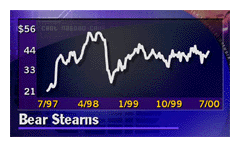|
Brokerage deals - the buzz
|
 |
July 12, 2000: 5:45 p.m. ET
After PaineWebber deal, investors speculate over next brokerage takeover
|
NEW YORK (CNNfn) - Who could be the next PaineWebber? That's what investors are pondering after UBS AG's $10.8 billion deal for Paine Webber Group, while the management teams of second-tier brokerages may be weighing whether independence is worth a 47 percent stock boost.
After UBS announced the deal for PaineWebber, analysts quickly noted such a premium reflects the difficulty in getting a foothold in the United States securities market.
"Acquisition of PaineWebber by UBS illustrates scarcity value for U.S. securities firms and high-net-worth oriented financial distributors," Merrill Lynch analyst Judah Kraushaar said. "I don't know that it will set off a round of deals, but I think that it could set off speculation that some second-tier firms could be put into play."
The speculation started quickly, as investors boosted the shares of potential acquisition candidates.
Shares of Bear Stearns Cos. Inc. rose 1-11/16, or 3.79 percent, to 46-1/4 in late afternoon trading, while J.P. Morgan & Co. jumped nearly 4 percent, or 4-5/8, to 122-9/16 and was the strongest Dow component of the day.
Lehman Brothers Holding Inc. rose 5-3/16, or 4.87 percent, to 111-5/8.
In the crosshairs
According to Salomon Smith Barney analyst Guy Maszkowski, Bear Stearns (BSC: Research, Estimates) is the best bet for a takeover.
"Up until now the [Bear Stearns] management has never really wanted to consider selling but again the stock is trading at an extremely discounted multiple," Maszkowsi said. "It has seen its strongest U.S. competitors grow at a 30 to 35 percent rate and build their European M&A business up which Bear Streans hasn't really gotten into yet."
 Kraushaar said the key to whether second-tier companies will sell is how well their basic business is going. He listed Bear Stearns as a possible takeover candidate, but noted most second-tier firms seem independent minded. Kraushaar said the key to whether second-tier companies will sell is how well their basic business is going. He listed Bear Stearns as a possible takeover candidate, but noted most second-tier firms seem independent minded.
Bear Stearns is lacking a strong European presence, but does well elsewhere around the global. The firm is strong in Asia and is the leading underwriter of equities in Latin America.
The company beat fiscal second-quarter earnings expectations, but revenues fell 3 percent. The company attributed the drop to rising interest rates. Bear Stearns earned $214.4 million, or $1.40 per diluted share, for the quarter ended May 26, up from $198.1 million, or $1.38 per share, in the year-earlier quarter.
At current valuation the firm is worth about $5.1 billion.
Lehman Brothers (LEH: Research, Estimates), the fourth-largest U.S broker, is another potential target, but the company's strong financial performance of late could keep it on the independent road.
Lehman trounced second-quarter earnings expectations by 29 cents and recorded a record 49 percent of its revenue from overseas markets. The company reported net income of $378 million, or $2.78 a diluted share, for the quarter ended May 31, up from $330 million, or $2.09 a share, in the year-earlier period.
According to analysts, Lehman is strong in technology underwriting and in Europe. But the company was hurt by its exposure in Russia during the economic turmoil in late 1998.
Lehman is worth about $13.5 billion using the current stock price.
Strong results for both Bear Stearns and Lehman came despite a sluggish stock that was expected to hurt the bottom line of financial companies.
J.P. Morgan (JPM: Research, Estimates), which moved its concentration from commercial to investment banking, could find the transition easier with a strong European partner. But again, strong earnings are not going to make J.P. Morgan desperate for suitors.
The company beat analysts' expectations by 20 percent in the first quarter, and benefited from market volatility. But analysts contend competition is tough for the bank and it may have trouble remaining independent.
J.P. Morgan already commands a hefty price tag though, at a current valuation of about $20 billion.
Other companies mentioned by analysts were Legg Mason Inc. (LM: Research, Estimates) and Neuberger Berman Inc. (NEU: Research, Estimates).
Maszkowski said Merrill Lynch (MER: Research, Estimates) and Morgan Stanley Dean Witter (MWD: Research, Estimates) are big enough and powerful enough to stay independent.
Over there
Earlier this year U.S. companies used the same tactic as USB to get into the European securities market, paying big bucks for a more global place in underwriting and investment advisory.
In January, Citigroup Inc. (C: Research, Estimates) bought U.K. bank Schroders PLC for $2.21 billion, putting it under the umbrella of Salomon Smith Barney. The deal doubled Salomon's European investment banking platform.
In April, Chase Manhattan (CMB: Research, Estimates) acquired a U.K. investment house, Robert Fleming Holdings, for $7.7 billion to boost its relatively small investment-banking unit.
Chase's Chairman and CEO William Harrison did not rule out further acquisitions for the company. 
|
|
|
|
|
 |

|

